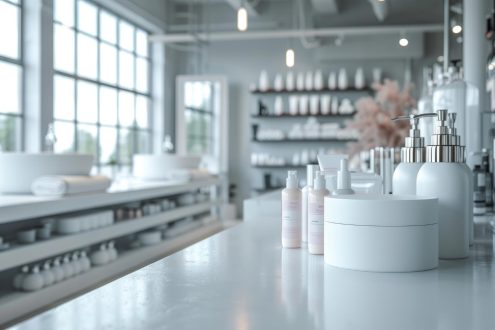- Empty cart.
- Continue Shopping
Essential Licenses and Permits for Starting a Skincare Business
Essential Licenses and Permits for Starting a Skincare Business 
Starting a skincare business requires more than just product development; it also involves obtaining the proper licenses and permits. These legal steps ensure your business complies with federal, state, and local regulations, helping to protect your brand and customers. Here’s a guide to the essential licenses and permits needed for a skincare business.
1. Business License
- Why It Matters: A business license legally allows you to operate your skincare business in your state or locality.
- How to Obtain It: Apply for a business license through your city or county government office. Requirements and fees vary by location, so check with your local authorities. Most applications require basic business information, such as your business name, address, and type.
Tip: Be sure to renew your license annually or as required by your state or locality.
2. Sales Tax Permit
- Why It Matters: A sales tax permit allows you to collect sales tax from customers, which is required in most states.
- How to Obtain It: Apply for a sales tax permit through your state’s Department of Revenue. You’ll need this if you plan to sell products directly to customers online, in-store, or at events.
Tip: Sales tax regulations vary, so check specific requirements in your state, especially if you sell products online to out-of-state customers.
3. Cosmetic Manufacturer or Seller’s Permit
- Why It Matters: Skincare products are classified as cosmetics, which are regulated to ensure consumer safety.
- How to Obtain It: Requirements for a cosmetic manufacturer’s or seller’s permit vary by state. In some cases, you may need a specialized permit to produce or sell cosmetics, particularly if you’re formulating products in-house.
Tip: Consult with local or state agencies to confirm what permits are needed for cosmetics manufacturing and sales in your area.
4. FDA Registration
- Why It Matters: The FDA requires certain cosmetic businesses to register, particularly if they plan to market their products across state lines.
- How to Register: While registration is generally voluntary for cosmetic companies, it’s strongly encouraged. If you’re making over-the-counter (OTC) products (like sunscreens or anti-acne products), you must register and comply with FDA regulations.
Tip: Regularly check FDA guidelines, as cosmetic regulations can change and impact your business’s compliance.
5. Good Manufacturing Practices (GMP) Certification
- Why It Matters: GMP certification ensures products are produced in safe and hygienic conditions, crucial for customer safety.
- How to Obtain It: The FDA sets GMP guidelines for cosmetic manufacturers. While it’s not mandatory to have a GMP certification, following these standards can improve product safety and quality. You can also seek certification from a third-party organization to demonstrate GMP compliance.
Tip: Following GMP guidelines can help you avoid contamination and maintain consistent product quality, which is critical in skincare.
6. Home Occupation Permit (if operating from home)
- Why It Matters: Many skincare startups begin as home-based businesses, but some cities or counties require a permit for this.
- How to Obtain It: Check with your city or county zoning office to see if a home occupation permit is necessary. This permit allows you to legally operate a business from your home and ensures it complies with local zoning laws.
Tip: Be aware of any restrictions on business activities in residential areas, like limits on the type of equipment or the number of shipments allowed.
7. Trademark Registration (Optional)
- Why It Matters: Registering your brand name, logo, or slogan as a trademark protects your brand identity.
- How to Obtain It: Apply for a trademark through the United States Patent and Trademark Office (USPTO). While it’s optional, a trademark protects your brand from competitors and prevents others from using your brand elements.
Tip: Consider trademarking your brand once it gains traction to safeguard your brand’s reputation and identity.
8. Product Liability Insurance
- Why It Matters: Product liability insurance protects your business in case of claims related to product safety or adverse reactions.
- How to Obtain It: Contact an insurance provider specializing in product liability for cosmetics and skincare. This insurance can cover legal fees, settlements, or damages if a customer files a claim against your product.
Tip: Product liability insurance is especially important for skincare, as reactions to ingredients can vary among consumers.
9. Employer Identification Number (EIN)
- Why It Matters: An EIN is required if you hire employees, and it’s helpful for filing taxes.
- How to Obtain It: Apply for an EIN through the IRS website. It’s free, and you’ll use it to identify your business on tax documents and when opening a business bank account.
Tip: Even if you’re a sole proprietor, an EIN can help separate personal and business finances.
10. Environmental Permits (if applicable)
- Why It Matters: Some production processes in skincare manufacturing may have environmental impacts, requiring special permits.
- How to Obtain It: Check with local environmental agencies to determine if any production activities (e.g., waste disposal) require a permit. Environmental permits are often necessary for larger facilities or those with specialized waste disposal needs.
Tip: Regularly audit your environmental impact to ensure compliance and align with sustainable practices.
Benefits of Securing Essential Permits and Licenses
- Legal Compliance: Avoids penalties or business closures by adhering to regulatory requirements.
- Consumer Trust: Showing compliance with health and safety standards builds trust with customers.
- Brand Protection: Trademarks and liability insurance protect your brand identity and safeguard against legal claims.
Conclusion: Building a Legally Compliant Skincare Business
Securing the necessary licenses and permits ensures your skincare business operates legally, creating a foundation of trust with customers and protecting your brand. By following these steps and maintaining compliance, you can focus on building a successful skincare brand while confidently navigating the regulatory landscape.
Interested in creating your own product line? Explore our private labeling options and bring your brand vision to life. Fill out our Form to get started.
Discover more about our services by visiting our website.

